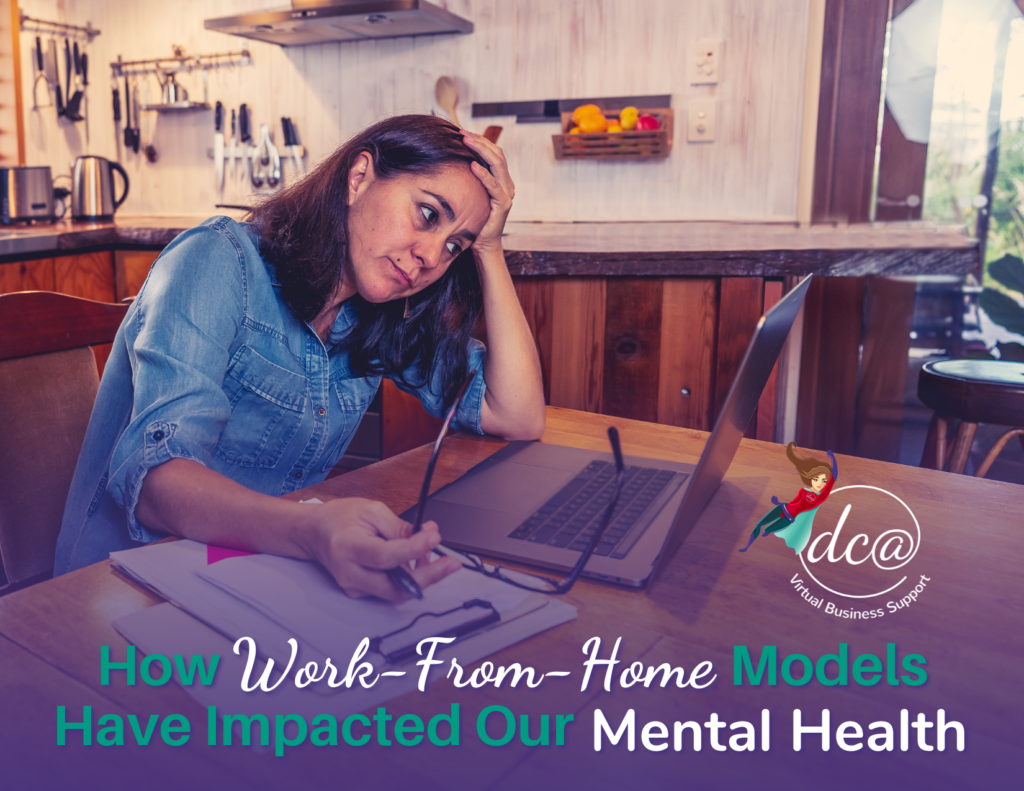
How Work-From-Home Models Have Impacted Our Mental Health
Work-From-Home Business Models are Trending
In the last few years, where, when, and how we work have undergone significant transformation. A large part of this shift can be attributed to COVID-19, which forced companies to adopt work-from-home models. Even after it was safe to return to the office, many companies decided to implement hybrid business models, or go fully remote and not return at all. As of 2023, nearly 50% of full-time employees work completely remote or hybrid.
Whether you are for or against work-from-home business models, remote work has impacted our mental health in both positive and negative ways. How? Let’s find out.
Impact of Remote and Hybrid Business Models on Mental Health
While remote and hybrid business models offer numerous mental health advantages, they also come with their own set of challenges. We’ve compiled a list of the top positive and negative impacts these models have had on our mental well-being.
Positive Impacts
Increased Flexibility
Remote work often provides employees with greater flexibility in managing their work schedules. This can lead to improved work-life balance, allowing individuals to better juggle personal and professional responsibilities.
Reduced Commuting Stress
The elimination of daily commutes can lead to reduced stress levels, as commuting is often a major source of frustration and exhaustion for many workers.
Access to More Jobs and Resources
Having the option to work remotely allows employees to have access to a wider range of job opportunities beyond their geographical location. Thus, resulting in more career options and possibly better-suited jobs which can lead to higher job satisfaction.
Personalized Work Environment
If you want to work from your patio, you can. If you want to work in the living room while your child plays, you can. If you want to wear your PJ pants while you work, you can. Remote work allows employees to create a personalized and comfortable work environment, which can contribute to increased job satisfaction and reduced stress.
Negative Impacts
Isolation
Working remotely can lead to feelings of isolation. 53% of remote workers say it’s harder to feel connected to their coworkers. Individuals who may be more vulnerable to feelings of isolation are those who live alone or have limited social interactions. Having little to no face-to-face interaction with colleagues can lead to a sense of loneliness and disconnectedness.
Blurred Work-Life Boundaries
While remote work offers flexibility, it can also blur the boundaries between work and personal life, making it challenging to achieve a healthy work-life balance. This can result in strained relationships, longer work hours, constant availability, and difficulty in disconnecting from work-related thoughts, leading to burnout and increased stress levels.
Technostress
Constant reliance on technology and digital communication platforms can result in what is known as technostress. This includes feelings of anxiety, frustration, and overwhelm related to using technology. 69% of remote workers report increased burnout from digital communication tools. Frequent video calls, screentime overload, and troubleshooting technical issues can contribute to mental strain. Some refer to this as Zoom Fatigue.
Substance Abuse and Coping Mechanisms
Work-from-home and hybrid business models have led to an increase in alcohol and substance abuse, which is part of the whole mental health package. Those with existing and pre-existing substance abuse issues are more vulnerable. With increased access to alcohol and other substances it is much easier to feed one’s addiction privately or for one to develop. The inability to disconnect and blurring of boundaries mentioned earlier can also contribute to substance abuse.
To mitigate the potential negative impacts, it is important for organizations to prioritize the mental health of its employees and help employees establish strategies by setting clear work-life boundaries, facilitating social connections, encouraging regular breaks, and offering support to employees when they need it.
For more insight into managing remote employees, listen to the Nurture Small Business podcast!
